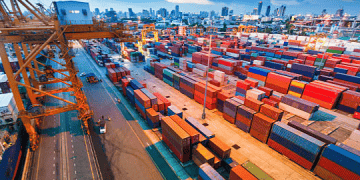Various shipping lines are expanding their services to establish direct connections for efficient cargo transport between Chattogram Port in Bangladesh and Chinese ports, which serve as a primary source for local imports. This year, two prominent shipping lines have expanded their services, and a new consortium has launched a direct service. According to official data, Bangladesh imported goods valued at $17.8 billion from China in the fiscal year 2022-23 while exporting $677 million. In the previous year, imports amounted to $20.87 billion and exports to $683 million, reflecting a trend of significant trade imbalance in favor of China.
Stakeholders indicate that direct routes to Chinese ports can reduce transportation time by approximately 50% compared to routes that involve stopovers at transshipment ports in Singapore and Malaysia. Currently, at least 10 shipping lines are operating various services between Bangladeshi and Chinese ports, either independently or through joint ventures.
In June, Mediterranean Shipping Company (MSC), a leading global container shipping line, resumed its Bengal service with six vessels connecting Ningbo and Chattogram via Shanghai and Qingdao. Previously, this service included transshipment ports in Singapore and Malaysia but was modified to provide direct access to Chinese ports after a year of operation.
AP Moller-Maersk has introduced a new ocean shipping service called SH3 to support the increasing trade volume between the two countries. This service is in addition to three other existing services—SH1, SH2, and IA7. Although only one trip was completed, the service is expected to resume once trade volumes stabilize. Additionally, Singaporean shipping company Pacific International Lines (PIL) has partnered with Interasia Lines and SL Shipping to launch the China Chittagong Express (CCE), providing direct connectivity between Bangladesh and China. The inaugural vessel, Kota Anguun, departed from Ningbo on August 31 and reached Chattogram on September 16 after stopping at Shanghai and Shekou, completing the journey in nine days.
Ahsan Habib, head of operations at PIL, noted that this service allows for the direct transport of goods from China to Chattogram within nine to 15 days, bypassing the traditional transshipment ports. On the return journey, vessels will also sail directly to Ningbo. China is a major supplier of various items to Bangladesh, including machinery, accessories, commodities, and raw materials, particularly for the readymade garment industry, which relies on China for around 70% of its raw materials.
In August, Chattogram port received approximately 114,000 twenty-foot equivalent units (TEUs) of import-laden containers along with over 8,000 TEUs of empty containers. Muntasir Rubayat, a director of the Bangladesh Shipping Agents Association, mentioned that estimating the exact volume of containerized imports directly from China can be challenging due to significant transshipment activity. Officials from various shipping lines report that around 60% of Bangladesh’s total containerized imports originate from China, with a growing portion now being transported via direct services. Data indicates that over 41,000 TEUs of import-laden containers arrived directly from China in August.
Nasir Uddin Chowdhury, chairman of the Bangladesh Garment Manufacturers and Exporters Association, emphasized the advantages of direct shipping services for garment exporters, noting the reduced time in receiving imported raw materials. Efficient supply chains are essential for maintaining competitiveness in the global market. Kharul Alam Suzan, Vice President of the Bangladesh Freight Forwarders Association, highlighted the delays typically experienced when transporting goods via transshipment ports, which can often lead to congestion. He noted that while exports from Bangladesh to China remain limited, the shipping services primarily facilitate one-way trade.
Get comprehensive supply chain report news updates at The Supply Chain Report. For international trade tools, see ADAMftd.com.
#SupplyChainNews #BangladeshTrade #ShippingIndustry #ImportExport #LogisticsUpdate















